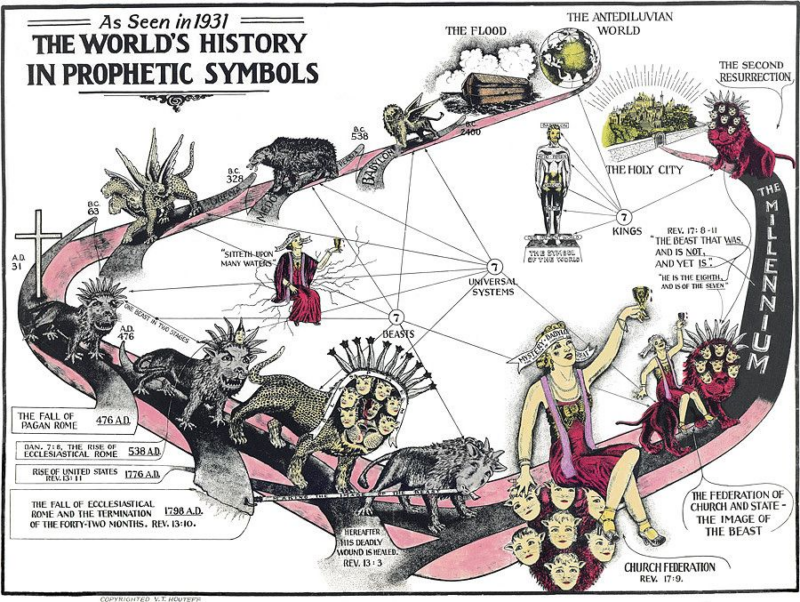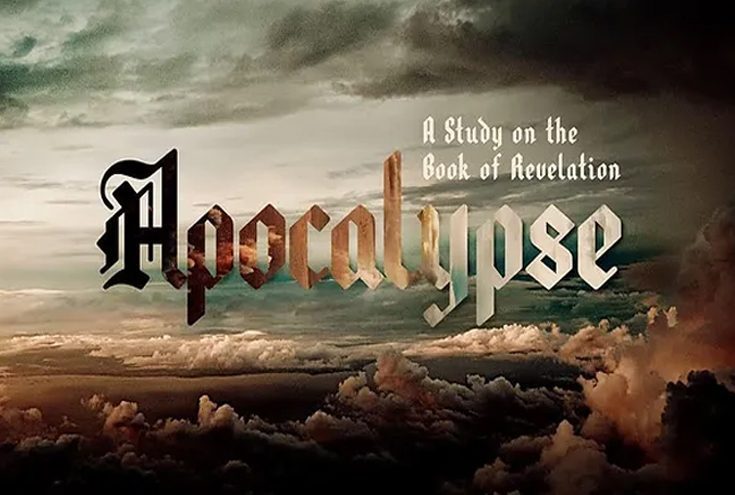Steve Gregg wrote a very good book on Revelation: Four Views, a Parallel Commentary.
And a revised and updated edition.
In the book he states that whereas some readers may be curious about his own position (Steve Gregg), the commentary is not a showcase for his opinions, “which have changed a number of times and may do so again in the future” (page 4). Rather, he says that in his research, he has become increasingly convinced that, as Albertus Pieters wrote:
“None of these schools of interpretation can claim any monopoly on scholarship or faith. Each group numbers many fine scholars and devout Christian believers. Therefore complete certainty in regard to the interpretation of the Apocalypse is not to be had. It is our duty to do the best we can, to study the various systems and accept the view that seems to us to be right, but always with a certain amount of reservation and of respect for the opinions of others (pages 4-5).”

The book is formatted in an easy to understand comparison with explainations of the first books and letters to the churches with summarys of the four views. Gregg takes the main body of Revelation, chapters 4 through 22, in four columns for the four major views: the historicist, the preterist, the futurist, and the spiritual approach. The historicist view sees Revelation as a record of the course of history from the time of the apostles to the end of the world; it is thus still in progress.
The preterist view sees Revelation as future from the standpoint of the writer, but having been fulfilled not long after the author’s own time (generally 70 AD), and thus it is history from our standpoint. Some preterists believe the final chapters of Revelation still look forward to a future second coming of Christ, while others believe that all of Revelation has been fulfilled.
The futurist view believes that the prophecies are of events which are yet future from our perspective. Everything after chapter 4 is usually held to refer to things that will occur in a short period (i.e. a 7- year period known as the Tribulation) before the return of Christ.
The spiritual view takes Revelation as a kind of drama, which depicts spiritual truths which may occur over and over throughout history, such as the conflicts “between Christ and Satan, between the saints and the antichristian world powers, and depicting the final victory of Christ and his saints” (page 3). Thus fulfillment may be seen as “entirely spiritual or as recurrent, finding representative expression throughout the age, rather than in one-time, specific fulfillments” (page 3). Thus the prophecies are applicable to Christians in any age.
The church has been persecuted throughout time and some of the worst visible persecutions were to the first followers of the way. Yet, that never stopped as there has always been great tribulation taking place upon the earth in all generations. Even this very day.

What to believe?
We are not the first generation to have varied opinions of the interpretations of the book of Revelation, however, from Gregg’s opinion of seeking the truth… and knowing we all are seeking that… we do well to respect one anothers opinions… and not get into needless debates that cause anger and frustrations. One thing is true for any view a person may hold, and that is, the book was written to the followers of the way of Jesus to encourage their faith at a time of great persecution through a vision given to John from Jesus our Lord and unto the end of the age. It was sent to the churches as a prophetic Word for clarification, correction and encouragement. Foretelling the promises to come and encouraging faith.

Symbols and their meanings…
The people of the time of John understood the customs and symbols used in allegory and understood the letter’s content or code words much more than todays generation who are not taught these things. The same as we know what brand icons mean… so did they understand much more what the fighting from the horses mouths meant versus locusts whose sting was in their tails. I understand today, as a matter of opinion… mouths speak great swelling lies and those work very effectively on battle fields for mind control, propaganda and psyops. Stings in tails work quite well for destruction such as explosives, bombs, fire, poisons…and any number of things that kill and destroy and or inflict pain and suffering. However, I am sure that the same as in the book of Daniel and other scriptures where symbols were used, the people of the time knew also understood what such things meant. There were many examples such as Daniel having the understanding of the 70 years spoken of in Jeremiah… that they would be in captivity for 70 literal years.

Other places they understood that 70 weeks of years meant 70 times 7 or 490 years. As in Jubilee years. Of which they understood forbidden books such as the book of Jubilees where it explains such things. So those who studied the books of the prophets had an advantage to understanding that we have lost over the generations by forbidding to read many books that clarified many more things. Hiding history and mixing things up hasn’t helped us at all either.
In all that I have read, and to be honest… it has been some years since I actually read it and I can’t remember if I even read it all or jumped around? Honestly, I am certain I jumped around in it and swam here and there. I’ve had the book for a couple decades and to be honest it isn’t dog earred, nor worn like my Bible. But I do have a lot of margin notes. Smile.
That being said, today I am a student more ready to read Steve Greggs book with deeper concentration, even cover to cover, which I began again to do. Sometimes in the past, I bought books and already had my mind made up, but was curious as to the other opinions… (just being honest) and sometimes I bought books that I was not ready to understand fully what I was reading, so they sat there for a number of years until I could understand what was being said. Like when I bought the book by Albert Pike, “Morals and Dogma” thinking I would learn more about the Knights Templar and after ordering it and reading, I had no idea what it was about… and had to keep it because returns on special orders weren’t allowed back then at the Walden Book Store. Smile. Later, as I grew in understanding, and that book was brought up with Albert Pike… I then ran and referred to the book for I now knew what it was about.
The same with any books and even the Bible itself. As I grew, I was ready to see what it was I was reading. As I’ve said before, we all learn at different stages and some faster than others. The love of seeking the truth of God’s word is a great love and God always answers. Sometimes, I’m like a little child who wants to write beautiful caligraphy and right now… and the Holy Spirit leads me to learn how to hold the pen first and play with some practice strokes. Smile. In other words, we may want to know all about algebra, but basic math must come first. We have a marvelous teacher in the Holy Spirit and our blessed Word of God.
Each must first open up the Bible and ask the Lord and Holy Spirit to show you what you are to learn. That’s how it works. Pray unceasing and remember your first love and that is to love God with all your heart, mind and soul and to love your neighbor as yourself. When we do those, we do all the commands of God for we are serving Him and His children with love, compassion, forgiveness, patience and tolerance. Just as God does with us in our imperfect selves.
Listen to Steve Gregg as he reviews his book on REVELATION – THE FOUR VIEWS REVISED AND UPDATED.
Here is a brief summary of the four approaches Gregg presents.
1. PRETERIST. MOST PROPHECIES IN THE BOOK OF REVELATION WERE FULFILLED DURING THE TIME OF THE ROMAN EMPIRE.
A word of caution here. Not all preterists are created equal. The term preterism can describe two very different approaches: 1) A belief that the text is not inspired prophecy, but is rather a description of certain historical events amidst fanciful apocalyptic imagery. 2) A belief that the prophecies of the book are divinely inspired and were fulfilled mostly in the first centuries after Christ.
The first type of preterist, theologically liberal, advocates a later writing of the book (A.D. 95), and while accepting the historical reality of certain events in the text, believes John’s apocalyptic visions were never, and will never be, fulfilled.
The second type of preterist, theologically conservative, believes in an early writing of the book (before A.D. 70). Those who advocate this view point out the correspondence between Revelation and the fall of Jerusalem in A.D. 70. They point to Revelation 1:1, 19, which says that the predicted events must must “shortly come to pass.” They also point to Jesus’ Olivet Discourse (Matthew 24) as primarily being fulfilled with the fall of Jerusalem to the Romans in A.D. 70.
Most conservative preterists allow, however, that the last chapters of Revelation describe the Second Coming of Christ.
2. HISTORICIST. THE PROPHECIES HAVE BEEN FULFILLED THROUGHOUT HISTORY AND ARE STILL BEING FULFILLED TODAY.
While this interpretation is not widely in use today, those who have been steeped in popular futurist views are often surprised to learn that most of the classic commentaries from a century or more ago are written from a historicist viewpoint. Many of the great leaders of the Reformation and later also held to this view: Wycliffe, Knox, Tyndale, Luther, Calvin, Zwingli, Melanchthon, Newton, Huss, Foxe, Wesley, Edwards, Whitfield and Finney.
According to historicists, Revelation is a kind of survey of church history, with historical events symbolically portrayed. Historicists believe that exact time periods are specified, assuming that each day specified in the text equals a year in real time.
The challenge for historicists has been to align actual events with the details in the text (an approach shared by preterists and futurists). This requires large amounts of conjecture, and the flexibility to revise interpretations in light of ongoing world events.
Another prominent feature of Protestant historicism is its belief that the Antichrist of Revelation refers to the Papacy. For this reason, some die-hard historicists assert that all other interpretations of Revelation are Satanically inspired attempts to obscure the Antichrist’s true identity.
In any case, historicism has fallen out of vogue. Critics point out that it has not kept up with history much past the 14th century and that it is Eurocentric — not recognizing more recent and significant developments in the church in other parts of the world.

3. FUTURIST. MOST PROPHECIES BEYOND REVELATION 3 ARE YET TO BE FULFILLED.
This is the view held by most contemporary North American evangelical writers and teachers. Somewhat ironically, futurism was originated in 1585 by Francisco Ribeira, a Spanish Jesuit priest, for the purpose of refuting the historicist views of the Protestant reformers.
The most popular version of futurism today is dispensationalism, which has only been around since 1830, when J.N. Darby began teaching his ideas of a secret Rapture of the church (Revelation 4:1) followed by a tribulation period, and a 1,000-year rule of Christ.
Futurists tend to take a literal view of the book of Revelation. Since futurists believe that few, if any, of the events from chapters 4-22 of Revelation have taken place, it is easy for them to assert that most of these prophecies are to be taken literally (whereas preterists, historicists and spiritualists must wrestle with symbolic interpretations of passages about the two witnesses and the four horsemen, for example).
This literal interpretation of the highly symbolic book of Revelation ignores the style of writing God inspired John to use. The first key in understanding literature of any type is to determine the kind (genre) of literature it is.
Revelation is prophecy, letter and apocalyptic — with the apocalyptic style predominating. Apocalyptic style was well known at the time John wrote, using cryptic meanings and symbolic images. Above all, apocalyptic literature is born of immediate persecution and oppression and anticipates the final triumph of good over evil.
Disregarding the language God inspires to convey his message, futurists conveniently avoid having their “this is going to happen in the near future” approach tested by historical events.
Dispensationalists, in particular, can prognosticate freely with the confidence that they will be raptured before the bulk of Revelation is fulfilled and will not be around on earth to be embarrassed by any inaccuracies in their predictions.
On further thought, this approach renders the book irrelevant and of little practical use for most Christians, as they either will have died or will have been raptured before its fulfillment.
In the video below, I found Gregg’s journey of coming to a different view very similar to my own journey.
Steve Gregg tells his present views… he no longer believes in dispensations. Listen to his views as to why …
4. SPIRITUAL (OR SYMBOLIC OR IDEALIST). MOST PROPHECIES PORTRAY THE ONGOING COSMIC CONFLICT OF SPIRITUAL REALITIES AND MAY HAVE MANY FULFILLMENTS THROUGHOUT HISTORY.
This actually represents a variety of approaches that look for lessons or principles — often recurrent in history — symbolically depicted in Revelation. Noting the apocalyptic style in which the book is written, this interpretation sees the central theme as the triumph of good over evil, of Christ over Satan. Passages that other approaches regard as depicting chronological events (such as the seals, trumpets and emergence of the beast) are regarded allegorically by spiritualists as recurring realities in history as part of God’s sovereign plan for humankind.
The obvious advantage of this view is that there is no need to match events described in the book to real events. The disadvantage is that the book of Revelation itself claims to predict certain specific events (1:1). 4 Views of Revelation – Steve Gregg · Christianity Without the Religion/Plain Truth Ministries (ptm.org)

You can purchase the book at: Revelation: Four Views: A Parallel Commentary by Steve Gregg (amazon.com)
Revelation: Four Views, a Parallel, Revised and Updated Revelation: Four Views, A Parallel… by Steve Gregg (amazon.com)
KEEP ON PRESSING INTO THE KINGDOM OF GOD! PRESS, PRESS, PRESS!
DIANNE

